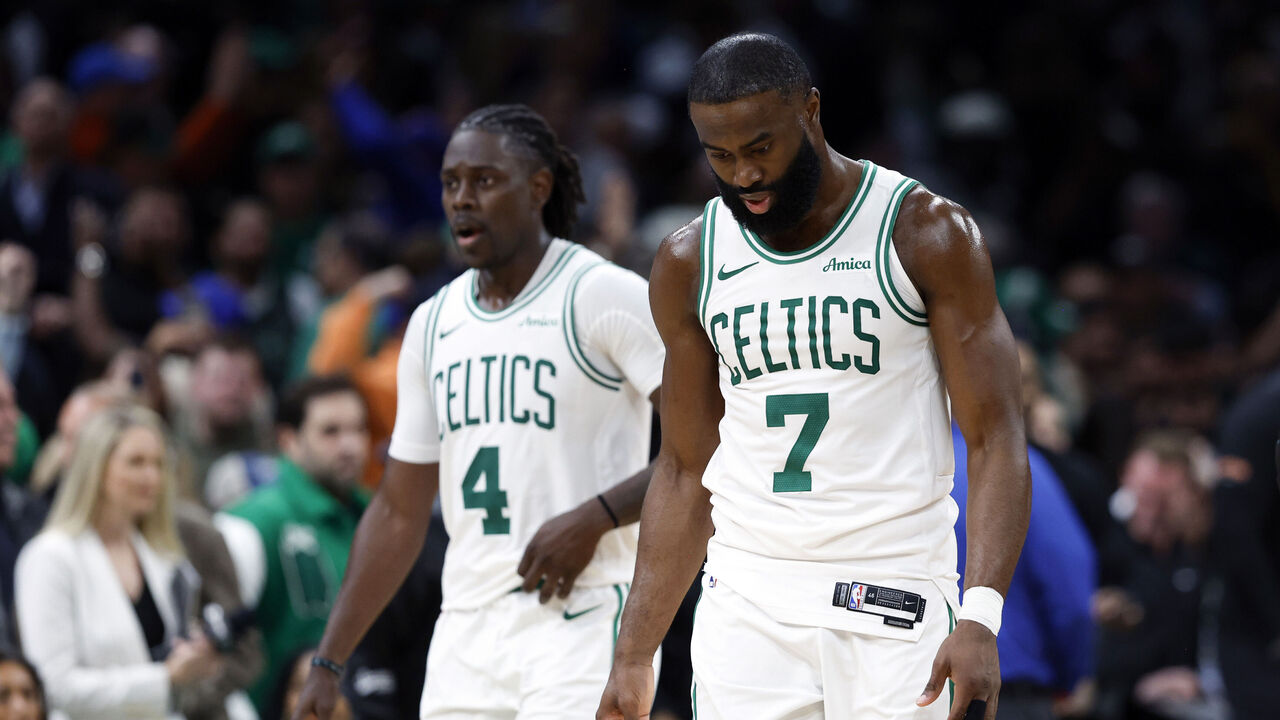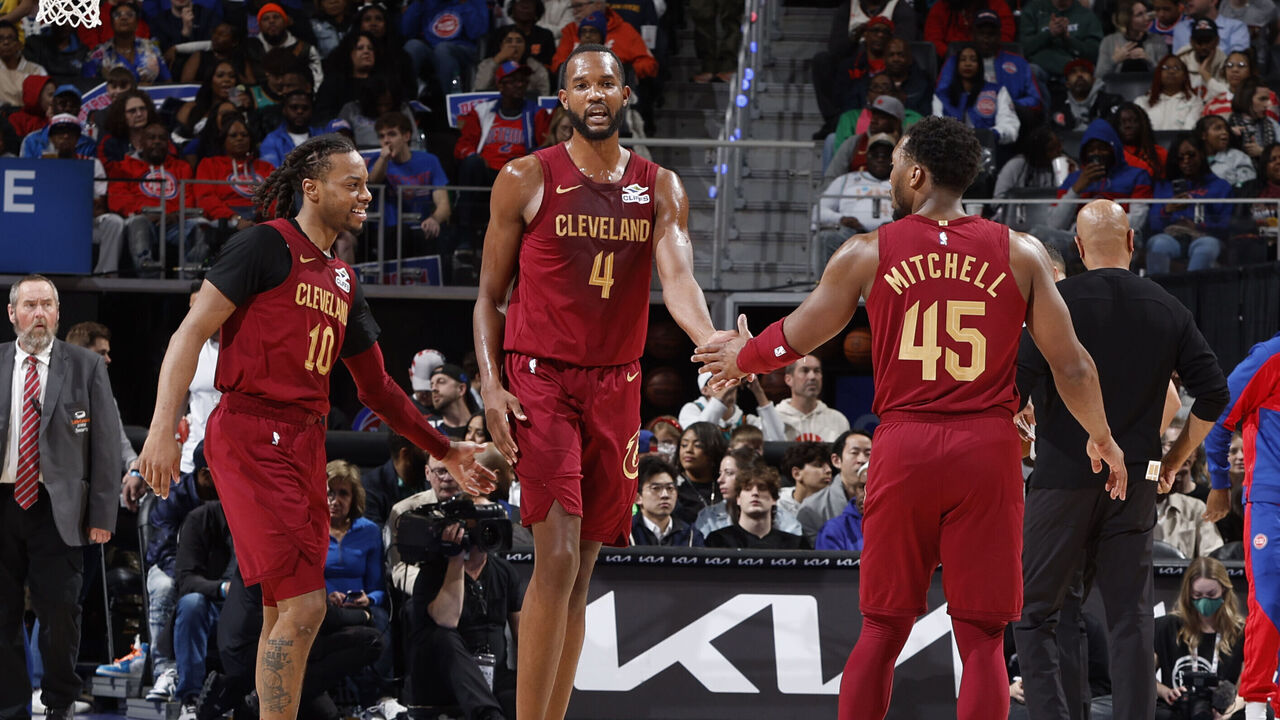What's next: Where the Celtics and Cavs go from here
Every year, 29 teams fall short of the ultimate goal. And every year, those 29 teams ask themselves how they take that next step.
Here's a look at how the East's top two seeds might go about answering that question after both got bounced ahead of the conference finals.
Boston Celtics

Boston's title defense ended earlier than anyone expected, but the real story of the Celtics' second-round loss to the Knicks was Jayson Tatum's Achilles injury. The Eastern Conference semifinal didn't just see a champion dethroned - it immediately threw the franchise's future into doubt and shifted the league's balance of power.
First and foremost, it's a shame for Tatum, a 27-year-old ironman who's never missed more than 10 games in a season and has logged 1,500 more minutes than any other player since his NBA debut (regular season and playoffs). As the best player on the defending champions and a two-way force who's been the backbone of this decade's most consistent contender, the Celtics will fall off without him. There were already questions about how long Boston's new owners would stomach massive luxury tax payments and second-apron penalties. By the time Tatum returns, the roster might look a lot different.
However, Tatum's injury could change the calculus regarding his long-term partnership with Jaylen Brown. Trading Brown to maintain a financially feasible contender around Tatum would've made some sense before the latter's Achilles gave out. Boston should now look to take a step back in 2025-26, shedding salary in the short term to again build around Tatum and Brown in 2026-27 and beyond.
Letting Al Horford walk as a free agent will be tough, but ultimately necessary. Ditto for trading Jrue Holiday, who's owed up to $104.4 million over the next three years and will likely be 36 years old when Tatum returns. If the Celtics can extract any value from Holiday's contract and Kristaps Porzingis' expiring ($30.7-million) deal, they should, no matter how many wins it costs them next season.
If Boston can do that without taking on any long-term money, it could drastically improve its financial flexibility. Instead of sitting roughly $20 million above the second apron in 2025-26, the Celtics could position themselves with over $45 million worth of wiggle room under the first apron in 2026-27. And they'd still have Tatum, Brown, Derrick White, Payton Pritchard, and Sam Hauser (plus Neemias Queta, Baylor Scheierman, and Jordan Walsh) under contract. Boston also controls five of its seven first-round picks between 2026 and 2032.
Tatum's injury was a disheartening reminder of how fleeting success and windows of contention can be, but it doesn't have to be the last chapter for the Two Jays era in Boston. The Celtics just have to make a few shrewd decisions today to restart their course tomorrow. - Joseph Casciaro
Cleveland Cavaliers

The 2024-25 Cavaliers won 64 games and produced the 16th-best relative offensive rating in NBA history. Kenny Atkinson won Coach of the Year in his first season on the sidelines. Evan Mobley made a major offensive leap and became the fifth-youngest player ever to take home Defensive Player of the Year honors. Darius Garland had a massive bounce-back campaign and earned his second All-Star nod. Donovan Mitchell will probably make the All-NBA first team. And every member of Cleveland's regular rotation besides Ty Jerome and Sam Merrill is under contract for next season. That's the good news.
The bad news is that all those regular-season accomplishments didn't save the Cavs from a familiar fate in the spring. Their second-round faceplant against a fast, physical, relentless Indiana Pacers squad marked the third straight year their core four has experienced some degree of playoff disappointment. In light of those recurring letdowns, there will naturally be calls for the front office to break this thing up.
The counterargument would be that serious mitigating factors contributed to Cleveland's demise, namely the injuries that sidelined and/or significantly hampered four of its five most important players in the series. Garland missed the first two games (both home losses) due to a toe injury and never looked right after returning. Mobley sat out Game 2 with a sprained ankle and didn't resemble himself again until Game 5. De'Andre Hunter dislocated the thumb on his shooting hand in Game 1 and was a disaster from that point on. Mitchell carried the offense with some heroic performances before succumbing to calf and ankle injuries and running out of gas.
It was a particularly exasperating way for the Cavs' campaign to end considering how much they prioritized depth and managing their stars' workloads throughout the year. No one on the team averaged more than 31.4 minutes per game, which contributed to them being one of the healthiest squads in the league ... right up until they weren't. After injuries prevented it from taking a legitimate run at the Celtics in the second round last postseason, this was supposed to be the chance for Cleveland's core to prove its growth since an embarrassing first-round showing against the Knicks in 2023. Instead, the front office is again left to sift through a mess of conflicting information as it tries to determine what these guys are actually capable of.
Some troubling issues cropped up in the series that Cleveland can't entirely overlook. The Cavs' beautiful offensive system broke down into a muddy puddle of isolations when things got tough. At the other end, Indiana gashed a defense that was supposed to be one of Cleveland's chief strengths, doing particularly vicious damage against switches and eventually solving the team's fail-safe zone. The lights again seemed a bit brighter than expected for Jarrett Allen, as he managed just 11 points and six rebounds combined over the final two games and was soundly outplayed by Myles Turner. And Jerome, who played a huge role in the team's regular-season success and finished third in Sixth Man of the Year voting, was exposed for his defensive limitations and reliance on tough pull-ups and long floaters.
The Cavs can spend the summer thinking about how things might've been different if they'd stayed healthy or held onto huge leads in Games 2 and 5. But all that matters now is what Koby Altman and Co. decide to take away from all this, and how their interpretation of events shapes the club's course of action this summer. That could mean marginal moves like letting Jerome walk and handing over backup point guard duties to Craig Porter Jr., or trying to trade someone like Isaac Okoro to trim down their luxury-tax bill. Or it could result in something more significant, like moving out one of the core four.
Cleveland can also just run it all back and enter next season as one of the clear favorites in a destabilized Eastern Conference. Mitchell is a proven superstar and a playoff riser, Garland and Mobley are still getting better, Allen is a top-10 two-way center in the league, and the wing corps is stronger than it's been at any point in this era. Last summer, the front office resisted the urge to make changes for the sake of changes, and the team wound up organically changing quite a bit.
Sometimes, the most courageous thing an organization can do after a disappointing result is ... nothing. No overreactions, no rash personnel moves - just a show of faith in the infrastructure that engendered enough success to establish expectations in the first place. We're about to find out how much or how little that faith has been shaken in Cleveland. - Joe Wolfond